Written by Roseline Yang (Community Relations Officer)
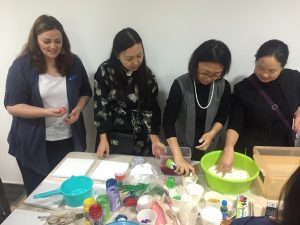 Since we will be celebrating the Week of the Young Child at YCIS from April 24 to 28, we decided to interview one of our ECE teachers to get a grasp of what life is like in the ECE world and Nadine seemed to be the right person to ask! Let’s meet Nadine Fletcher.
Since we will be celebrating the Week of the Young Child at YCIS from April 24 to 28, we decided to interview one of our ECE teachers to get a grasp of what life is like in the ECE world and Nadine seemed to be the right person to ask! Let’s meet Nadine Fletcher.
At the beginning of the year, you approached me to offer a workshop for parents about Art in ECE called “Messy Play” and everyone enjoyed it. Recently, you offered to present another messy play workshop for later in the year. Why is that?
First of all, I love to share my passion for art and to help others develop their creativity, especially children. I believe that every child is born possessing creativity. It is a great pleasure to work with creative, young children every day at YCIS. However, it seems that their inborn creativity toward exploration and discovery is sometimes limited by their “learnt” rules set by their environment. Therefore, through these workshops, my aim is to help parents and ayis in Shanghai understand that the process of messy play, whether it is painting or mud, is not hindered by rules, such as, “Don’t make a mess!”, “No water is to be spilt on the floor” and “Make sure you keep your clothing clean!”. I tell my parents that “DIRT is GOOD – if your child comes home dirty, they have learnt something…”
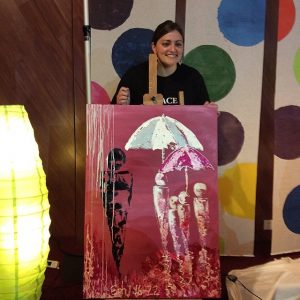 Let me give you two examples – The first one is at the beginning of the school year, when we introduced for the first time an activity to explore sand and foam, none of the children wanted to take part of it, because they did not want to “get their hands dirty”. If we had to put this activity in front of a one-year old, for sure, he would have started to touch it and play with it, because exploring and discovering comes natural to him. Older children’s attitude towards this activity reflects a “learnt” behaviour. The second example is a Mom who asked me after the school day “Why is my child’s coat so dirty?” I explained to her that her child was crawling during outdoor play, taking on the role of a cat. Children learn through their five senses and exploring their environment with ALL parts of their bodies, including their knees and elbows. Thus, we all should be celebrating chaos and dirt to help our children build confidence in the area of creativity.
Let me give you two examples – The first one is at the beginning of the school year, when we introduced for the first time an activity to explore sand and foam, none of the children wanted to take part of it, because they did not want to “get their hands dirty”. If we had to put this activity in front of a one-year old, for sure, he would have started to touch it and play with it, because exploring and discovering comes natural to him. Older children’s attitude towards this activity reflects a “learnt” behaviour. The second example is a Mom who asked me after the school day “Why is my child’s coat so dirty?” I explained to her that her child was crawling during outdoor play, taking on the role of a cat. Children learn through their five senses and exploring their environment with ALL parts of their bodies, including their knees and elbows. Thus, we all should be celebrating chaos and dirt to help our children build confidence in the area of creativity.
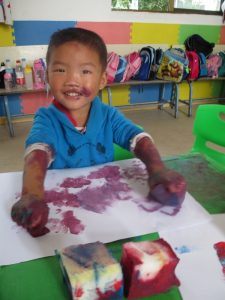 What do you mean by dirt is good?
What do you mean by dirt is good?
When I talk about being dirty, I mean, your child comes home with paint, mud, food stains, glue or sand on their clothing. I don’t mean the children should roll around in paint, however, I mean while they are in the process of painting a picture, let them explore without interrupting their thoughts with your input, such as, “Put on an apron! Be careful not to get any paint on your sleeves!” I understand that adults get nervous about children getting messy, especially with the clothes. But clothing can be replaced or washed. Your child’s thoughts in the moment of exploring with paint, freely, cannot be replaced – that moment will be gone forever! If we want children to learn, they need time to play, create, explore, discover and experience! (Discussions about taking care of our belongings, like our clothing, can take place during a dinner time conversation or by reading a story about it – not while they are playing).
 Very interesting…but then it adds up a lot of work for parents or caregivers. Isn’t there any other way to help them learn and play by keeping themselves clean and safe?
Very interesting…but then it adds up a lot of work for parents or caregivers. Isn’t there any other way to help them learn and play by keeping themselves clean and safe?
Yes, of course. There are “clean” toys your child can play with. However, toys can be limited in their functionalities. For example, if you give a toy to a child that teaches them the alphabet or numbers, like a singing doll or computer, this will only be limited to what the toy is offering to the child. Imagination will be contained, whereas, sand, mud or messy art, collage materials, recycled materials offer unlimited ways of playing. One day, you can build a castle with the sand. The next day, you can bake a cake. Every day can be different and options are infinite. Moreover, in the process of playing, children are learning. How much math lessons would you have to pay for your child to get the concept of empty and full, when he could just play with water and a cup to figure out? I guess that this is my way of seeing things because I have spent all of my childhood playing and exploring the nature around me..
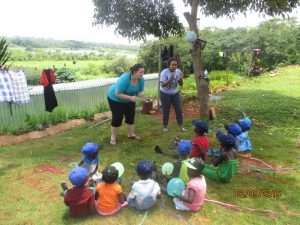 True! Please remind us about your roots and educational background.
True! Please remind us about your roots and educational background.
I grew up in South Africa on a farm outside Matatiele, Kwazulu Natal. My Father was a farm manager on a big crop-cattle farm. I used to play in the fields from morning till afternoon with my other 3 siblings and neighbours. I was a weekly border in a government school from the age of 6 until 18 – every weekend I was back at the farm, climbing trees, tending to all my pets and swimming in dams and reservoirs. I had a wonderful childhood free to explore the world, from mountains to forests. When it was time to decide what I wanted to study after high school, teaching young children was at the top of my list, as I knew that this would allow me to use my creativity. I studied a Bachelors Degree in Education in Early Childhood Development (Foundation Phase) at the University of South Africa (UNISA) in Pietermaritzberg and I worked for 3 years and a half for the kindergarten in our farming community. Then I heard about YCIS from a friend whose parents were working at YCIS and are still here as we speak. This is my 5th year in China, at YCIS.
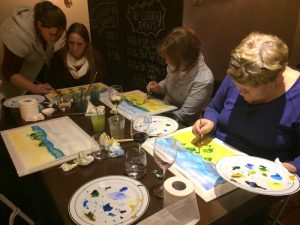 And you specialized in Art, correct? I saw that you were also organizing an artistic event to raise money for a charity last month.
And you specialized in Art, correct? I saw that you were also organizing an artistic event to raise money for a charity last month.
Actually, I am a self-taught artist. I took water colour art lessons when I was in South Africa and began exploring acrylics when I arrived in Shanghai. I found the Shanghai community so interesting, especially when meeting a person who was passionate for art and humanitarian aid. She did not only allow me to join her in creating artwork, she also made me realize that my country needed help and that I could contribute to it. This friend is an American – and seeing my country through her eyes, made me realise just how much help they need. I realized I had gotten used to the poverty around me and this basically opened my eyes and my heart to doing MORE. That is how we started to organize art workshops, such as Sip and Paint for our charity organization “Art for Africa – To Africa with Love”. The money we raise is to help with children’s school fees, school uniforms and AIDS/HIV medical help. Last month, my art workshop “Sip & Paint” gathered friends and people interested in painting and although many of them said they could not draw or paint, they proudly went back home with a painting of their own creation!
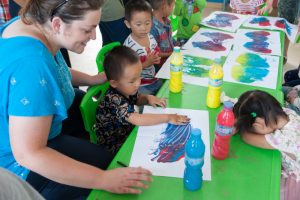 So just to come back and finish our interview, what do you enjoy the most in teaching in ECE?
So just to come back and finish our interview, what do you enjoy the most in teaching in ECE?
The philosophy of the ECE at YCIS perfectly fits with my vision as it focuses on learning through play. I love teaching in ECE and I would never change it for anything. Why? Because working with ECE children, every day is different, unpredictable. Every day, I can see growth and the teaching style is less formal, more flexible and free. What I enjoy best is to create sensory activities and collect different types of materials allowing children to experience their creativity. Being creative does not mean being able to use a paintbrush – creativity flows into all areas of our development, such as, dance, music, math, literature and more – creativity is NEVER ENDING!
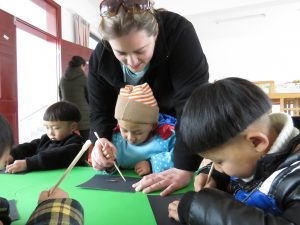 Once we become an adult – and especially when we become parents, we tend to forget our inner child and our confidence to walk up to a blank piece of paper and just start… pick up a pen, paintbrush, stamps, and just go for it.
Once we become an adult – and especially when we become parents, we tend to forget our inner child and our confidence to walk up to a blank piece of paper and just start… pick up a pen, paintbrush, stamps, and just go for it.
Nadine’s main objective is to awaken all parent’s inner child and let them enjoy and remember how free they felt when they were young. Living the experience through her workshops will help reconnect you with your inner child and will help you remember and understand how important it is to let your child develop their creativity through discovery and exploration. Lets work together to let our children CREATE out of our box of rules!
“Get messy, get dirty, get soap and water and get clean, then get messy again!”
